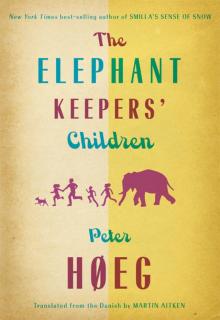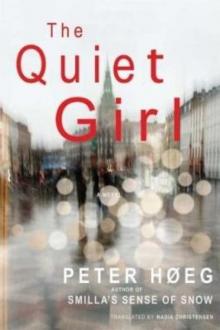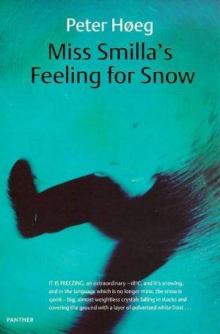- Home
- Peter Høeg
The Woman and the Ape Page 3
The Woman and the Ape Read online
Page 3
She walked through the door. Clapham clicked his heels together and handed her a lilac blossom. Smiling at him over the flower, she waited for his line. But it never came.
“Mr. Burden called,” he said. “He’s coming home early. To work.”
Madelene put down the flower, grabbed hold of the chair and eased herself down into it. Adam had never worked at home before. She was not sure that he had ever spoken of his work at home. She had had the feeling that it was his intent—and one that he had only ever declared to himself—not to so much as think about it once inside the walls of the park.
“Work,” she repeated. “On what?”
Clapham’s face closed, turning into that of a stranger.
“That you would have to ask Mr. Burden, madam.”
Madelene looked away. Clapham had not called her madam since they had first been introduced.
He stood up and put down his cup.
“Duty calls,” he said.
And he turned his back on her.
* * *
From the games pavilion, just below the terrace, Madelene fetched a racquet—the last part of her disguise.
The tennis court lay on the other side of the house, and it was in this direction that she headed with a lively spring in her step, but she did not go all the way there. The momentum and optimism in her gait lasted only as far as the corner, which, once rounded, hid her from view. From that point onward her movements became stealthy and feline. Leaving the gravel path, she walked through a door in the gable end of the house’s other wing, and straight into the potting shed.
The room was warm and humid as a rain forest, half the roof was glazed, flowerpots and hotbeds held thousands of cuttings, water lilies in bloom floated in a large freshwater tank. Madelene caught sight of her own reflection in the door of a stainless-steel cabinet and smiled reassuringly at herself. Then she did as she always did.
She took a pipette from a wire shelf, a Pyrex flask from a cupboard, a little measuring glass from a drying rack. She removed the rubber cork from a demijohn packed in excelsior and drew off eight ounces of 99.6 percent alcohol for hospital and laboratory use. She then topped up the flask with distilled water from a plastic container. The resulting liquid was 55 percent alcohol. She knocked back the first half glass.
In her alcoholism, as in everything else, Madelene was pretty much on her own. She had no one to advise her, no companion and no experience. She was in the process of discovering alcohol, as a lone traveler explores a new continent. She did not know why she did it, nor did she want to know. But she sensed that 55 percent was the optimum. At 55 percent, just before the first rush, as the volatile vapor was absorbed into the mucous membrane of the throat, the destruction of the mouth cells brought an exquisite burning sensation. This burn was essential. In it there was clarity, in it Madelene discerned something of the spirit of abuse: the intense, all-consuming urge to self-destruct.
This was followed by the first wave of inebriation. She located herself in the cabinet door. Slowly, in the void within her, a hot pulsating spirit flame flared up. From having been nothing she was rapidly becoming something.
Mombasa Manor was hers, the park was hers, the world was hers. And she looked great. Not a fault to be found anywhere. She toasted herself, congratulated herself. Then she took a drink.
She swung a stylized backhand at the stainless-steel surroundings. A queen had a need for and a right to some space. She drew the racquet back over her shoulder and arched her body in a perfect fake smash at the door in front of her. The door into the garden room. She put down the racquet. The recollection of the ape struck her with the same force as the alcohol. She turned the door handle and went inside.
Mombasa Manor had been built with African rather than British conditions in mind: African wages for the servants, the African climate and the social round of the British colonial administration. When it proved too large, too expensive and too cold for London, the entire side wing—with the exception of Clapham’s flat on the first floor and the workshops along the gable end—had been closed off. Madelene had passed through the room she now entered on only a handful of occasions. She recalled heavy tasseled curtains, plastic sheeting covering the carpets, bags around the chandeliers, dustcovers over the furniture and a heavy scent of something that was gone and would never come again.
The room was now in use.
It was a large room—more of a small hall really—extending, by means of a conservatory of glass and white-painted steel, fifteen feet into the park. The entrance to the conservatory had now been blocked by a metal grille. A tropical thicket of ferns, hardwoods and low bamboo had sprung up in front of this grille. And around the vegetation, splitting the room from floor to ceiling for two-thirds of its width, ran a glass partition. At the spot where Madelene entered the room the glass abutted on the wall. On the other side it came up against a white metal barrier topped by white bars that reached to the ceiling.
Next to the thicket grew a climbing tree of the type found in children’s playgrounds. Next to the tree lay two tractor tires. Next to the tires stood a wheelbarrow filled with fruits and vegetables. Next to the wheelbarrow sat the ape.
With some effort Madelene succeeded in coming up with a sketchy log of the past two days. The ape had arrived the day before yesterday. She had spent yesterday in bed with her carafe and that dreadful migraine. The bulk of the setup in front of her must have been erected in less than a day.
The ape was asleep, sitting on its haunches, with its back against the wall.
Access to the cage was gained through a door in the metal wall. Affixed to this door were feeding and temperature charts and a vaccination checklist. There were two latches on the door. Madelene lifted both and stepped inside.
As soon as she crossed the raised doorsill she became aware of a subtle burning under her skin, as though her nervous system were overheating. The same sensation that she experienced when the alcohol seared the epithelium of her throat and mouth. That faint, almost cheerful call of the longing to go under.
She closed the door behind her.
“How do I look?” she said.
At the sound of her voice the ape opened its eyes. Madelene crossed over to the animal, one step at a time, until they were about ten feet apart, sat down on one of the tractor tires and placed the flask and glass at her feet.
The crossing of this boundary had rendered her all but sober. From a gentle, stupefying warmth radiating from her stomach she had moved into a state of crystal-clear hypersensitivity. She could hear them both breathing, her own breath coming twice as fast as the animal’s. She filled the glass and drank.
“Cheers,” she said.
There was a fleeting moment of pleasure in knowing that one could not be understood. Then she met the ape’s gaze.
It was open, incalculable.
Madelene was overcome by a prickling sense of unease, as though she had sat on an anthill. She shifted position and still the ape kept its eyes on her. She had the feeling that she was being unmasked, spied on, scrutinized, as though it saw right through her, saw her naked, devoid of makeup, and, worse still, saw her pathetic inner self, her insecurity, her worthlessness.
Flustered, she started to get to her feet. It occurred to her that she too was an ape, for, while she might well be able to leave this cage, and this house, she would not get very far before running up against the financial, social and marital barriers that circumscribed her life.
Her hands were frozen, shaking. She had spilled some of her drink onto her wrist, and the chill of the liquid evaporating had turned it to ice. Up she got.
“Sorry,” she said.
There was a peach dangling just in front of her. She followed the line of the branch on which it grew back to the trunk—the ape’s arm. It had handed her a peach.
Very slowly and gingerly she took the sun-kissed, ripe and downy fruit from the gray hand. Then she inched her way backward.
“Thanks,” she said. “As a matter o
f fact, I did forget to eat something this morning.”
two
Madelene’s bed measured six feet square; the bedclothes were of pink satin. To her it was both cocoon and kingdom and the only place where she could, on occasion, feel absolutely safe. Now she sat down in the center of it, legs crossed, with the carafe in one hand and a large medicine glass in the other.
Madelene liked to imagine that she inhabited a new age, one that had been ushered in by two more or less simultaneous events that had conspired to cancel out the past: her marriage and her discovery of B vitamins.
Whereas her marriage made it possible for her to escape from Denmark and her family, the large fifteen-milligram B1 tablets, available over the counter from any pharmacist, had provided her with an ally in the fight against hangovers and helped her to carry on, seemingly unaffected, no matter how much she had drunk.
Now she felt all shook up, with no idea of why this should be. She poured the contents of the carafe over these feelings like some soothing balm, and in order nevertheless to maintain a clarity for what lay ahead, for every swig she took two tablets and washed them down with half a glass of water.
What lay ahead was, like everything else in Madelene’s life, something that recurred at regular intervals, in this case once a week. But whereas she kept all other appointments with a blithe indifference, she approached this one full of expectation.
The person she was going to meet was already present in the room in the form of a dog-eared bus-pass photograph propped up against the framed portrait of Adam on her bedside table. The face was that of a pale, freckled woman. Her name was Susan and she was the only friend Madelene had ever had.
* * *
When she was ten years old Madelene was enrolled at the English school north of Copenhagen, an international boarding school and one of the last all-girls schools in Denmark. It was run by the sisters of an Anglican lay order and attended by the daughters of British businessmen and diplomats and the daughters of Danish parents who wanted their children out of the way and could afford to fulfill this wish in an academically defensible manner. Her first three years at the school seemed to Madelene to be a period of deathly hibernation, surrounded by teachers so distant as to be quite unreachable and by classmates who looked upon one another not as individuals but as representatives of that gray uniformity of which all were a part.
In her fourth year at the school a natural catastrophe occurred. Within just a few months sexuality broke out among all thirty girls in Madelene’s class.
The class had always been alarmingly quiet; in recent years this silence had deepened and the sisters had made the mistake of confusing restraint with apathy. In actual fact this stasis was an illusion. From the outset the girls had constituted a fluid which time had saturated with expectant, hormonal menace. Into this saturation there now fell a microscopic, never to be identified particle and around this sliver of the magic mirror the fluid crystallized. And then it exploded.
The catastrophe took various forms. None of the girls had known where they were headed and for some the change came as an incurable shock. On their bodies, which had until then been slender and boyish, swelled tumorous cushions of fat which held them back on the sports field, squeezed them out of their clothes and their familiar framework and exposed them to vitriolic masculine lust. Others were engulfed by the forces building up inside them. From a shy and tranquil childhood they were thrown—and threw themselves—straight into disproportionate, promiscuous prurience, first verbally, then physically.
It was like the end of a journey. They were like thirty lemmings all reaching the sea at once. And here they foundered in their convulsive attempts to stay in the world of childhood. If, that is, they did not throw themselves into the water and drown.
In the midst of this chaos Madelene and Susan caught sight of each other after years of unwittingly being an arm’s length apart. They looked at one another, briefly and thoughtfully, and found that amid the general immersion they were both staying afloat. At that instant and without a word being said, they knew that they had both come to a secret understanding with the forces now shattering the world around them.
In tackling what was happening to their pupils the sisters had recourse not only to training and experience but also to a modicum of resolute brutality. But the force inherent in such synchronism caught them off guard and it took them the better part of two years to regain control. After that time, however, after a succession of abortions and cases of venereal disease and two successful suicide attempts and, in the end, open mutiny followed by the last, definitive purge, they were left—on the face of it, at least—with nineteen well-adjusted, docile girls. Among them Susan and Madelene.
They had two more years at the school before disaster struck and during that time for the most part they went unnoticed. The people around them did not understand them and anything incomprehensible invariably remains invisible.
What they found in one another was a wantonness which, as far as their classmates and the sisters were concerned, went beyond the recordable range of the senses and into another, inaccessible dimension. They came to maturity like a couple of cubs. Bypassing the panic that struck their contemporaries, they quietly and undramatically grew toward an intense and certain knowledge of how it feels when it tickles. For most of the girls in the group to which they had belonged the journey ended here. For Madelene and Susan this was where the real journey began.
They were never in any doubt as to where it would lead them. Deep down in their neurological fundament they knew that what awaited them at the other end was a man. For whom as yet they had no name, face or even a body but whose nature they understood with instinctive assurance.
On this journey they helped one another. When the final grand expulsion left whole sections of the school deserted, they were given a room with four beds all to themselves and from this room they ventured out onto the high seas. The bed they shared was their ship, and the waters were first blue, then pink and finally dark red, and of the same delightful temperature as bath water.
During those two years they slept very little at night, nor was there any need to. Their love was like a game—leisurely, untouched by desperation and, for the most part, aimless. What they were trying to do was to surf for as long as possible over the torrid surface that spread beneath them.
They never spoke of what they were doing, not to others, not to each other, and not even to themselves. They knew that the fewer words one employs, the naughtier it becomes. No one ever saw one of them lay a finger on the other; in the life they shared with the rest of the school there was nothing to suggest that they were anything but very good schoolmates, chums and vaguely overlooked, quiet, fair-to-middling pupils at a good school. But alongside this sphere there lay another. And in that one a look, a flicker of a nostril, the way in which the tip of a tongue moistened the bow of the upper lip was enough to send a shaft of fire shooting from the inner thighs to the roots of the hair and on up into the blue sky.
Around this private, vivid, sensual orgy their everyday lives showed up, not surprisingly, in tones of charcoal-gray wretchedness. They were surrounded by teachers whom they feared, an overwhelming feeling of insecurity and schoolmates who were in much the same situation as themselves—having been handed over, at their fathers’ expense, to insensitive women conducting a ludicrous curriculum.
Under these conditions the girls’ friendship flourished, and it was there that they learned to love their bed.
At the end of two years Susan found her first lover outside the school. She was found out, given a warning, caught again and expelled, after which she was packed off back to London by her father, the British ambassador to Denmark, and consequently sucked out of Madelene’s life.
Twelve years were to pass before they met again, in London. During those twelve years they had not been in touch with one another at all and yet the bond between them had never been severed. Just as they had, at the school, spent whole days each in her o
wn corner of the bed, never exchanging a word, like fox cubs curled up and resting, safe in the knowledge of the other’s presence in the room, so, throughout their twelve-year separation, they had sensed the whereabouts of the other. At that moment when they stood face to face once more, Madelene saw beyond Susan’s two children and her husband and the nanny and Susan saw through Madelene’s makeup and the reek of alcohol and what they saw was that, behind the guises they assumed, some parts of the world they had shared remained intact.
Since then, every Tuesday afternoon when Susan’s children attended Danish lessons at the Danish church, they had gone for a walk together in Regent’s Park. Whereas people will usually endeavor to reduce the gulf that separates them, one from another, through conversation, these two had once and for all accepted the differences between them and their walk was taken gently, lingeringly and often in silence.
But not today. Today Madelene arrived late and immediately started talking.
“You’re on the board of the Royal Society for the Protection of Animals, aren’t you?” she said.
Susan had to think for a minute. She was on the board of various charitable organizations. To please her husband, to embellish her idleness and to have plenty of excuses for not being where she was expected to be.
“Then you must know Adam’s sister, Andrea?”
Susan shook her head.
“The Animal Welfare Foundation,” she said.
“What’s the difference?”
Susan fell silent. People interested her. First and foremost—besides Madelene and her own children—certain men. And farther out on the periphery of her awareness, the rest of the human race. For animals she felt a profound lack of interest.
And yet this question had conjured up, in her mind, an animal association. She remembered how she had always thought of Madelene as a cat, as loudly purring, electrified velvet or a sudden ball of fury with five switchblades on each hand. Now, within and behind her friend’s urgent and vehement questioning, she glimpsed a number of other animals, less elegant but more stubborn: a sheep, a donkey, perhaps a cow.

 The Woman and the Ape
The Woman and the Ape Smilla's Sense of Snow
Smilla's Sense of Snow Borderliners
Borderliners The Susan Effect
The Susan Effect The History of Danish Dreams
The History of Danish Dreams The Elephant Keepers' Children
The Elephant Keepers' Children The Quiet Girl - Peter Hoeg
The Quiet Girl - Peter Hoeg Smilla's Sense of Snow aka Miss Smilla's Feeling for Snow
Smilla's Sense of Snow aka Miss Smilla's Feeling for Snow